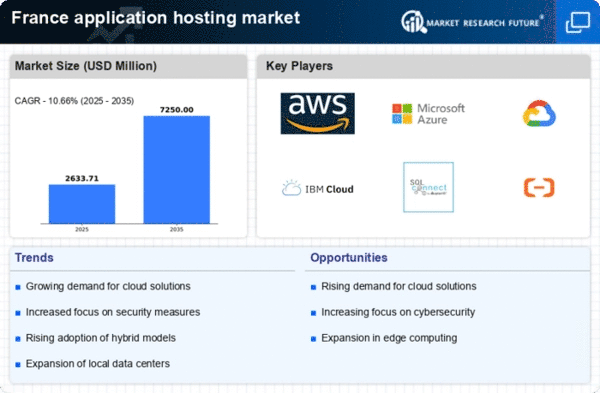Rising Demand for Scalability
The application hosting market in France experiences a notable increase in demand for scalable solutions. Businesses are increasingly seeking hosting services that can adapt to their fluctuating needs, particularly as they expand. This trend is driven by the necessity for flexibility in resource allocation, allowing companies to manage costs effectively. According to recent data, approximately 65% of French enterprises prioritize scalability when selecting hosting providers. This growing preference indicates a shift towards solutions that can accommodate varying workloads without compromising performance. As a result, service providers are compelled to enhance their offerings, ensuring that they can deliver scalable infrastructure that meets the evolving requirements of their clients. The application hosting market is thus witnessing a transformation, with an emphasis on providing dynamic solutions that align with business growth trajectories.
Adoption of Hybrid Hosting Models
The application hosting market in France is witnessing a marked shift towards hybrid hosting models. This approach combines the benefits of both on-premises and cloud-based solutions, allowing businesses to optimize their IT infrastructure. Companies are increasingly recognizing the advantages of hybrid models, which offer enhanced flexibility, improved performance, and cost efficiency. Recent surveys suggest that approximately 55% of French enterprises are exploring or have already implemented hybrid hosting solutions. This trend is indicative of a broader movement within the application hosting market, where organizations seek to leverage the strengths of multiple hosting environments. By adopting hybrid models, businesses can tailor their hosting strategies to meet specific operational needs while maintaining control over critical applications and data.
Increased Focus on Data Sovereignty
In France, the application hosting market is significantly influenced by the heightened focus on data sovereignty. With stringent regulations governing data protection, businesses are increasingly inclined to host their applications within national borders. This trend is largely driven by the General Data Protection Regulation (GDPR), which mandates that personal data of EU citizens be stored and processed in compliance with local laws. As a result, French companies are prioritizing local hosting solutions to ensure compliance and mitigate risks associated with data breaches. Recent statistics indicate that around 70% of French organizations consider data sovereignty a critical factor in their hosting decisions. Consequently, the application hosting market is adapting to these regulatory demands, leading to a surge in local data centers and hosting services that align with national compliance requirements.
Emergence of Eco-Friendly Hosting Solutions
The application hosting market in France is increasingly influenced by the emergence of eco-friendly hosting solutions. As environmental concerns gain prominence, businesses are becoming more conscious of their carbon footprint and are seeking sustainable hosting options. This trend is reflected in the growing demand for green data centers that utilize renewable energy sources and implement energy-efficient practices. Recent studies suggest that approximately 40% of French companies are actively looking for eco-friendly hosting providers. This shift towards sustainability is reshaping the application hosting market, as service providers are compelled to adopt greener practices to meet client expectations. By offering eco-friendly solutions, hosting companies can not only contribute to environmental preservation but also appeal to a growing segment of environmentally conscious consumers.
Growing Importance of Performance Optimization
Performance optimization has emerged as a crucial driver in the application hosting market in France. As businesses increasingly rely on digital applications for their operations, the demand for high-performance hosting solutions has surged. Companies are seeking providers that can deliver low latency, high availability, and robust performance metrics. Recent data indicates that around 60% of French businesses consider performance optimization a key criterion when selecting hosting services. This growing emphasis on performance is reshaping the application hosting market, compelling providers to invest in advanced technologies and infrastructure enhancements. By focusing on performance optimization, hosting companies can differentiate themselves in a competitive landscape, ultimately attracting clients who prioritize speed and reliability in their application delivery.
















